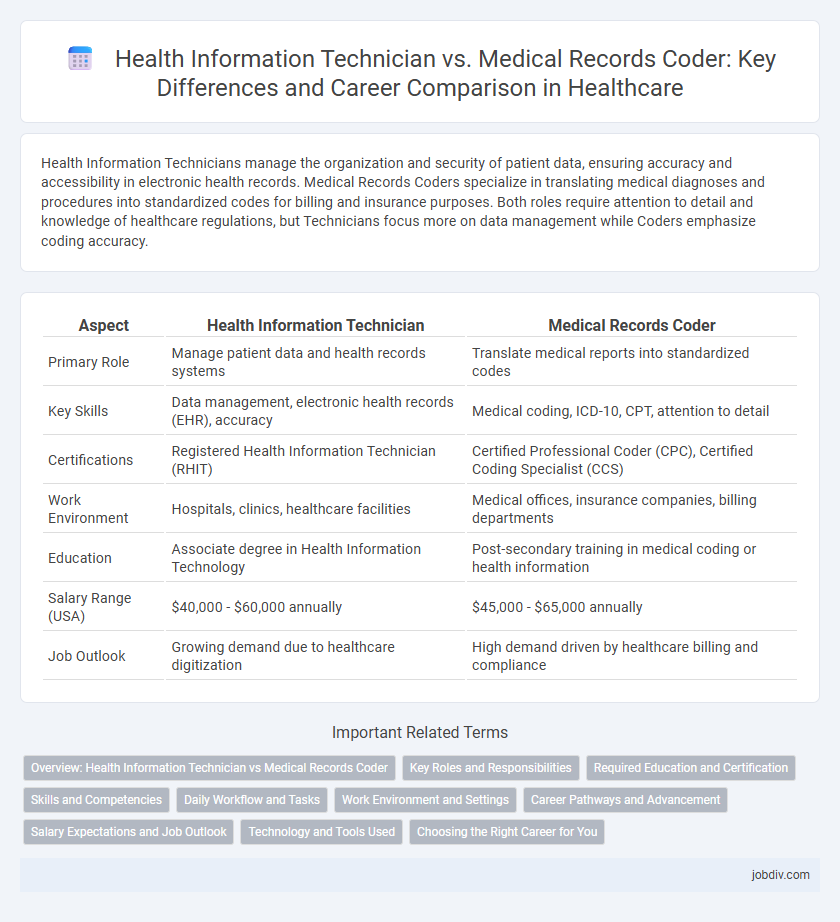Health Information Technicians manage the organization and security of patient data, ensuring accuracy and accessibility in electronic health records. Medical Records Coders specialize in translating medical diagnoses and procedures into standardized codes for billing and insurance purposes. Both roles require attention to detail and knowledge of healthcare regulations, but Technicians focus more on data management while Coders emphasize coding accuracy.
Table of Comparison
| Aspect | Health Information Technician | Medical Records Coder |
|---|---|---|
| Primary Role | Manage patient data and health records systems | Translate medical reports into standardized codes |
| Key Skills | Data management, electronic health records (EHR), accuracy | Medical coding, ICD-10, CPT, attention to detail |
| Certifications | Registered Health Information Technician (RHIT) | Certified Professional Coder (CPC), Certified Coding Specialist (CCS) |
| Work Environment | Hospitals, clinics, healthcare facilities | Medical offices, insurance companies, billing departments |
| Education | Associate degree in Health Information Technology | Post-secondary training in medical coding or health information |
| Salary Range (USA) | $40,000 - $60,000 annually | $45,000 - $65,000 annually |
| Job Outlook | Growing demand due to healthcare digitization | High demand driven by healthcare billing and compliance |
Overview: Health Information Technician vs Medical Records Coder
Health Information Technicians manage patient data by organizing and maintaining electronic health records, ensuring accurate documentation and compliance with healthcare regulations. Medical Records Coders specialize in translating patient information into standardized codes used for billing, insurance claims, and healthcare analytics. Both roles require knowledge of medical terminology, coding systems like ICD-10 and CPT, and proficiency with health information technology to support effective clinical and administrative functions.
Key Roles and Responsibilities
Health Information Technicians manage patient health data, ensuring accuracy, security, and compliance with regulations while maintaining electronic health records (EHR) systems. Medical Records Coders specialize in translating clinical documentation into standardized medical codes used for billing and reimbursement across healthcare services. Both roles require strong attention to detail, but Health Information Technicians focus more on data management and system operations, whereas Medical Records Coders concentrate on classification and coding accuracy.
Required Education and Certification
Health Information Technicians typically require an associate degree in health information technology and may obtain certification such as Registered Health Information Technician (RHIT) from the American Health Information Management Association (AHIMA). Medical Records Coders usually need a certificate or associate degree in medical billing and coding, with certifications like Certified Professional Coder (CPC) from the AAPC being highly valued. Both roles demand knowledge of medical terminology, coding systems like ICD-10 and CPT, and compliance with healthcare regulations to ensure accurate and secure patient data management.
Skills and Competencies
Health Information Technicians excel in data management, electronic health records (EHR) systems, and compliance with healthcare regulations, requiring strong technical and organizational skills. Medical Records Coders possess expertise in medical terminology, ICD-10 and CPT coding systems, and accuracy in translating clinical data for billing and insurance purposes. Both roles demand attention to detail, proficiency in health informatics software, and knowledge of privacy laws such as HIPAA.
Daily Workflow and Tasks
Health Information Technicians manage and organize patient health data, ensuring accuracy and accessibility in electronic health records (EHR) systems. Medical Records Coders specialize in translating clinical documentation into standardized medical codes for billing and insurance purposes. Both roles require attention to detail and familiarity with healthcare regulations but differ in task focus--technicians emphasize data management, while coders prioritize code assignment and accuracy.
Work Environment and Settings
Health Information Technicians typically work in hospitals, clinics, and healthcare facilities where they manage patient data systems and ensure accurate documentation. Medical Records Coders often operate within hospital coding departments, insurance companies, or billing offices, specializing in assigning medical codes for diagnosis and procedures to facilitate billing and insurance claims. Both professionals use electronic health records but Medical Records Coders have a more focused role on coding accuracy within diverse healthcare settings.
Career Pathways and Advancement
Health Information Technicians manage patient data systems and ensure accuracy in medical records, often requiring certification such as Registered Health Information Technician (RHIT). Medical Records Coders specialize in translating healthcare services into standardized codes for billing and insurance, with credentials like Certified Professional Coder (CPC) enhancing job prospects. Career advancement for Health Information Technicians may lead to roles such as health informatics specialist or compliance manager, while Medical Records Coders can progress to auditing, coding management, or clinical documentation improvement positions.
Salary Expectations and Job Outlook
Health Information Technicians earn an average annual salary of approximately $45,000, while Medical Records Coders typically make around $42,000, with variations depending on experience and certification. The job outlook for Health Information Technicians is projected to grow by 11% over the next decade, driven by increased demand for electronic health records management. Employment opportunities for Medical Records Coders are expected to expand by 8%, as healthcare providers seek skilled professionals to ensure accurate medical coding and billing.
Technology and Tools Used
Health Information Technicians utilize electronic health record (EHR) systems, data management software, and specialized coding tools to ensure accurate patient data entry and secure information storage. Medical Records Coders focus on advanced coding software such as ICD-10, CPT, and HCPCS applications to translate clinical documentation into standardized codes for billing and insurance purposes. Both roles integrate technology to enhance data accuracy, compliance, and efficient healthcare information management.
Choosing the Right Career for You
Health Information Technicians manage patient data systems and ensure accuracy in electronic health records, requiring strong organizational and technical skills. Medical Records Coders specialize in translating medical diagnoses and procedures into standardized codes for billing and insurance purposes, demanding detailed knowledge of coding systems such as ICD-10 and CPT. Choosing the right career depends on your interest in data management versus coding precision, as well as your preferred work environment within healthcare organizations.
Health Information Technician vs Medical Records Coder Infographic

 jobdiv.com
jobdiv.com